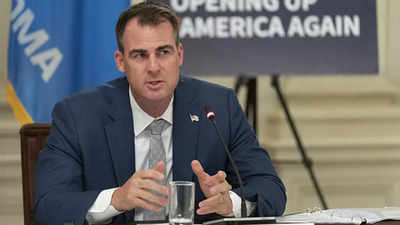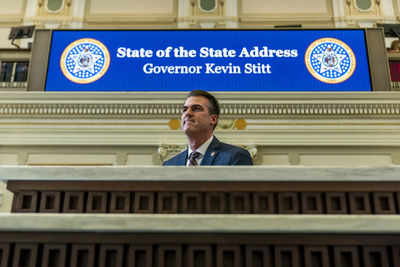
Governor Kevin Stitt rejects controversial proposal to gather students' immigration data in Oklahoma schools. (Getty Images)
Oklahoma Governor
Kevin Stitt announced his decision to block a controversial plan that would have required parents to provide their children’s
immigration status
when enrolling in
public schools
. The proposal, championed by State Superintendent
Ryan Walters
, was met with significant opposition from educators, civil rights groups, and immigrant communities.
Governor Stitt, a staunch opponent of illegal immigration, said the move to collect students’ immigration status was not a public safety issue and would create unnecessary fear among young children. "Collecting 6, 7, 8-year-old kids' addresses and immigration status in the state of Oklahoma, that’s not a public safety issue," Stitt said, as quoted by the Associated Press. "Let’s go after the people that are committing crimes, and let’s not terrorize and make our kids not show up for school."
Proposal met with backlash
The proposal, pushed by Walters and approved by the State Board of Education in January 2025, would have required parents or legal guardians to provide proof of citizenship for their children when enrolling them in public schools. Acceptable documents included US birth certificates, passports, or other legal immigration documents. The rule was intended to apply to all students, including young children entering kindergarten or first grade.
However, the plan quickly gained traction as a controversial move, particularly among educators and advocates for immigrant rights. Teachers voiced concerns that such a measure would create fear among immigrant families, potentially deterring children from attending school altogether. In a statement, Kica Matos, president of the National Immigration Law Center, praised Stitt's rejection of the plan. "The governor’s sound rejection of a radical attempt to undermine the right to education is a result of the concerted advocacy of parents, educators, and advocates across Oklahoma who mobilized to oppose it," Matos said, as quoted by the Associated Press.
Stitt's decisive action and political implications
Governor Stitt’s decision also included the removal of three members from the State Board of Education who had approved the rule. In a statement, Stitt expressed frustration that children were being used as "political pawns." He added that the focus should be on addressing the illegal immigration of adults who commit crimes, rather than targeting vulnerable children.
The controversy also highlights growing tensions within Oklahoma's Republican Party. Walters, who has frequently attacked “woke” ideologies in public schools, has been associated with more conservative factions within the state. Although Walters has not yet announced future political plans, some speculate he could seek higher office in 2026.
As reported by the Associated Press, Stitt’s rejection of the plan signals a shift toward more moderate stances within certain sections of the state’s Republican leadership, despite Walters’ continued efforts to promote conservative education policies.

 4 months ago
110
4 months ago
110





























 English (US)
English (US)